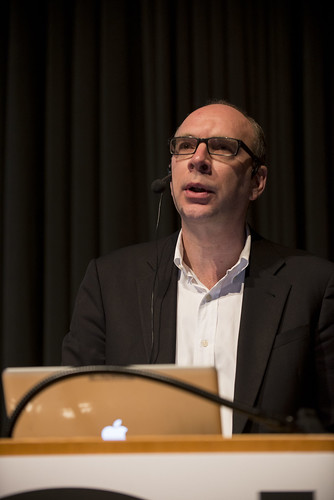Jay Rosen @ISOJ reflects on media companies’ pitfalls in 25 years of giving them advice

The second day at the 15th International Symposium of Online Journalism kicked off a keynote speech from Rosen, which he called “the most self-centered presentation” he ever gave. The associate professor at the University of New York and PressThink.org blogger reflected on the ups and downs he’s seen in 25 years of advising journalists and media companies.
In reflecting on all the solicited, unsolicited, collegial, semi-compensated and paid advice he’s given throughout his career, Jay Rosen, associate professor at the University of New York and author of the media criticism blog PressThink.org, also touched on the pitfalls that the media industry has suffered in recent years, particularly with the introduction of fast-paced digital journalism.
Among his criticisms of the industry was his opinion that journalism schools have allowed the practical training and the teaching of academic knowledge to move away from each other, something that he saw as a mistake. The problems of practicing journalism and the problems that affect journalism scholars should be the same thing, he argued.
In addition, a mismanagement of the world of online comments on news articles and blog posts have led to a negative attitude concerning public involvement in the media, and a lack of writer involvement in the comment threads has led to more vitriol and name-calling.
“The more people who participate, the better the press is… the better the journalism we get,” Rosen said, adding that journalists help foment involvement in public life, without which there would be no need for journalism.
“It’s taken years for journalists to learn about online comment forums… and we’re still not there. There’s been a great cycle of neglect followed by contempt in the comments section,” something he blames on journalists’ worry that going too far in consulting users will lead to a loss in ability to tell hard truths.
But a connection between truth telling and audience engagement is key to keeping readers civil and listening, he said. If the audience feels that most of the time you are listening to them, they might listen to what you have to say; people are most willing to hear hard truths from people who know something about us, he argued.
All of these issues, he said, are connected with a lack of training and mentorship in newsrooms, which are now relying on journalism schools to shoulder the bulk of journalists’ training and don’t give beginner journalists more than a day to get acclimated to a newsroom environment.
“In the phone sex industry, you have to be trained for three weeks before they let you start working… in the news industry you get one day to learn everything,” he said, adding that the news industry should be pressing journalism schools to help solve the problems instead of just relying on them to be a journalism boot camp.
“I see the practice of journalism as a heightened case of being a good citizen,” he said at the end of his address. “Freedom of the press belongs to everyone in the exact same way that freedom of speech belongs to everyone.”

